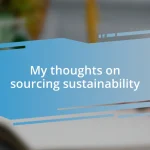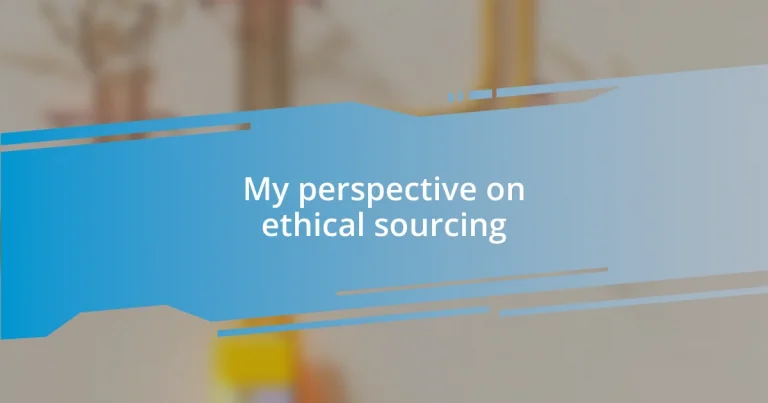Key takeaways:
- Ethical sourcing emphasizes transparency, sustainability, and respect for labor rights throughout the supply chain.
- Benefits of ethical sourcing include improved worker welfare, enhanced brand reputation, and reduced environmental impact.
- Future trends in ethical sourcing include technology for transparency, a focus on sustainability, and the promotion of diversity and inclusivity in supply chains.
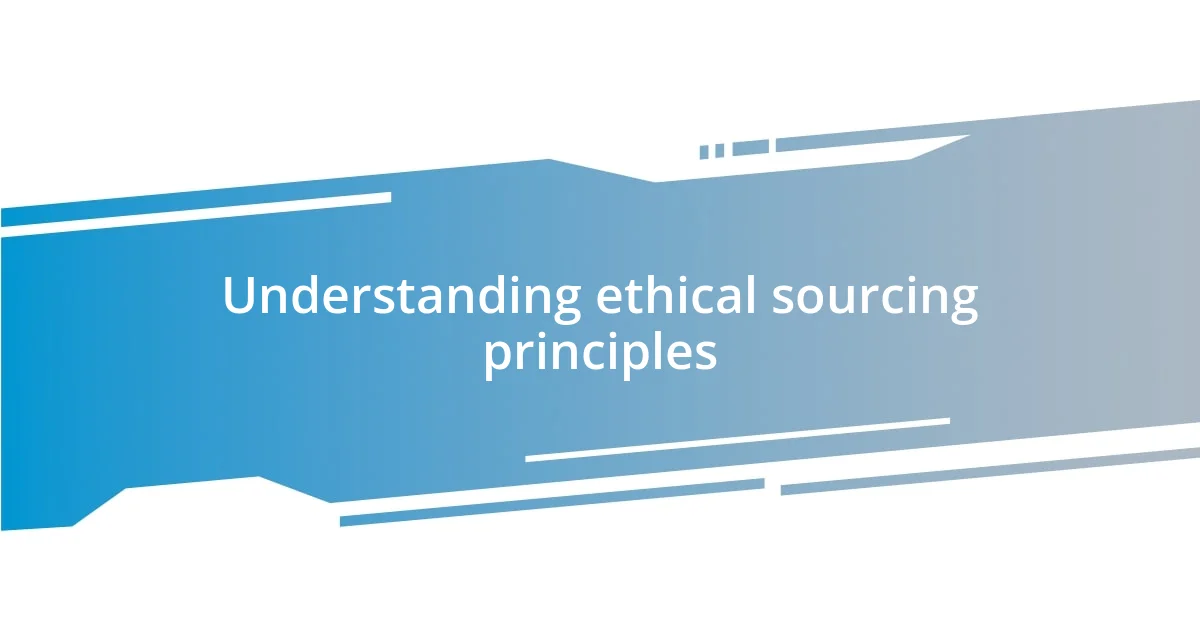
Understanding ethical sourcing principles
Ethical sourcing revolves around ensuring that products are made with respect for people, communities, and the environment. This means considering the entire supply chain, from the raw materials to the hands that create the final product. I still remember when I first learned about fair trade coffee—I was shocked to discover how often farmers are paid less than they deserve. Knowing this changed the way I choose coffee beans and made me more aware of the impact my purchasing decisions have.
A crucial principle of ethical sourcing is transparency. It’s essential for companies to disclose their sourcing practices, allowing consumers to make informed choices. Have you ever wondered where your favorite brand sources its materials and whether those workers are treated fairly? I found it eye-opening to research one of my favorite clothing brands and see the stark contrast between their marketing claims and the actual working conditions reported by workers in their factories.
Additionally, ethical sourcing promotes sustainability, which is vital for our planet’s future. I often think about how our choices today can affect future generations. For instance, when I learned about the detrimental effects of fast fashion on the environment, I realized I needed to support brands that prioritize sustainable materials and processes. This journey has made me passionate about seeking out companies that align with my values, reinforcing that every small change can contribute to a larger impact.
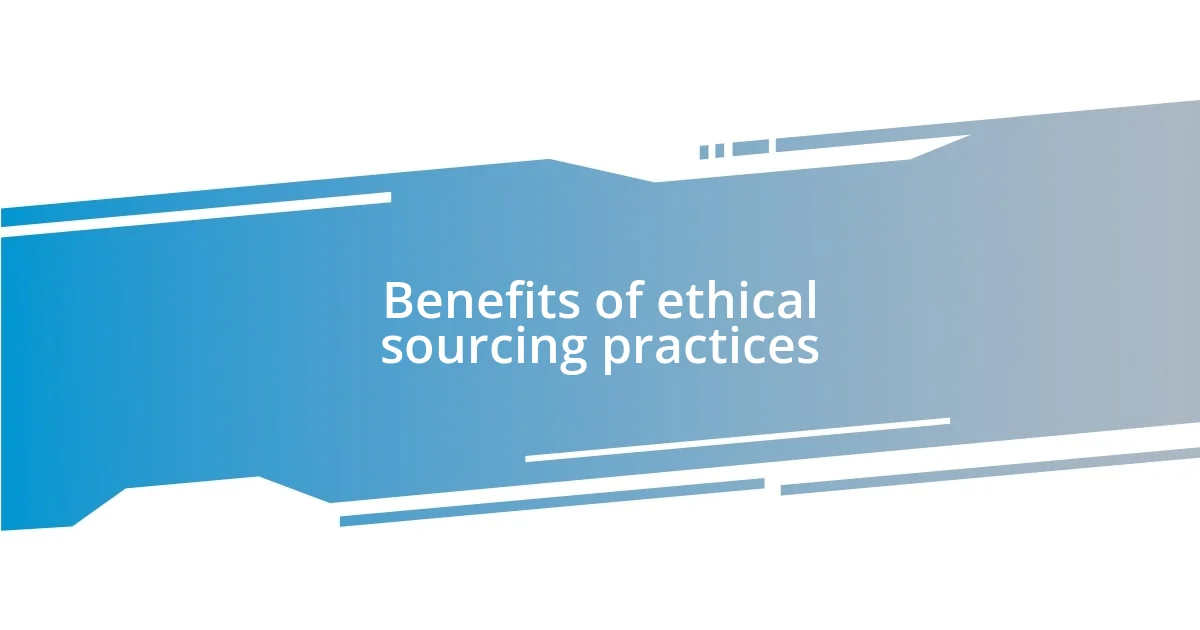
Benefits of ethical sourcing practices
One significant benefit of ethical sourcing practices is the positive impact on worker welfare. I once attended a workshop featuring a small company that partnered directly with artisans in developing countries. Hearing their stories about how fair wages transformed their lives left a lasting impression on me. It made me realize that when companies prioritize ethics, they’re not just improving life for workers but also fostering a supportive community atmosphere.
Another advantage is the enhanced reputation for brands that embrace ethical sourcing. I remember when a local bakery I love switched to sourcing organic and fair-trade ingredients. Their customer base expanded rapidly, as people felt a connection with their mission. It illustrated to me how ethical practices resonate with consumers, building loyalty and trust while attracting new customers who value integrity.
Lastly, ethical sourcing often leads to a reduction in environmental impact. I’ve seen firsthand how brands committed to ethical sourcing often innovate to utilize sustainable materials. When I purchased a pair of shoes made from recycled materials, it felt rewarding knowing I was contributing to a cleaner planet. This not only benefits the environment but also inspires others to make more conscious choices.
| Benefit | Explanation |
|---|---|
| Worker Welfare | Improves lives and creates better working conditions, fostering community growth. |
| Brand Reputation | Enhances customer loyalty and attracts new clientele through ethical practices. |
| Environmental Impact | Reduces harmful effects on the planet by prioritizing sustainable materials and processes. |
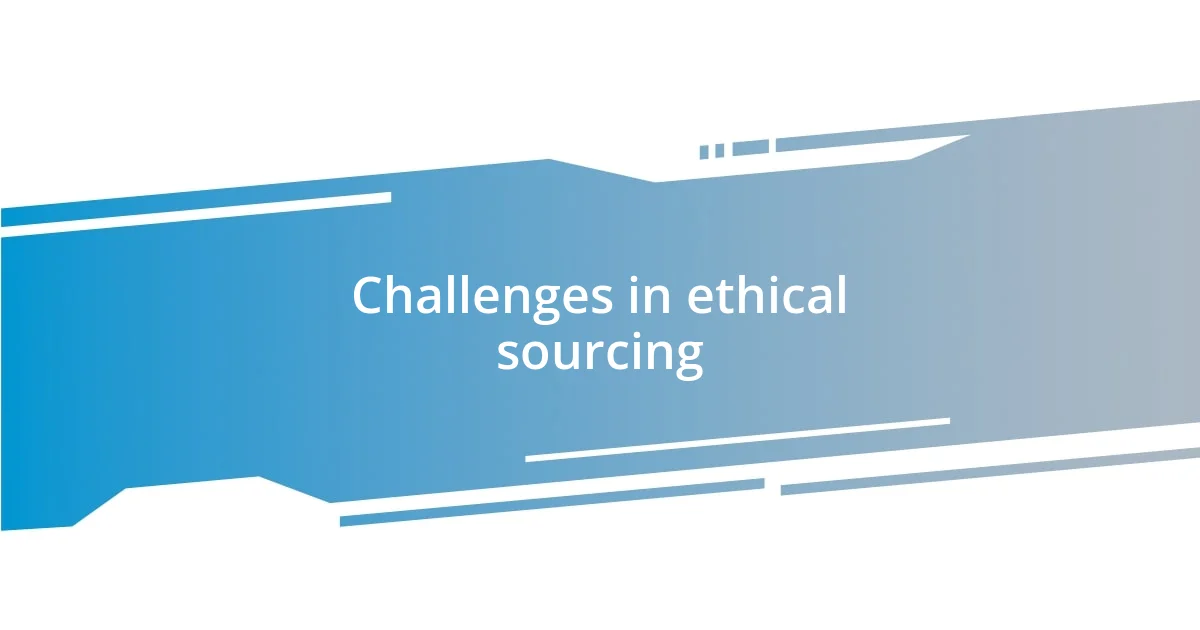
Challenges in ethical sourcing
One major challenge I’ve encountered in ethical sourcing is the lack of industry-wide standards. This inconsistency can lead to confusion for consumers trying to make responsible choices. When I faced this issue while shopping for eco-friendly products, I found myself questioning labels that claimed sustainability. It was frustrating to realize that not all certifications carry the same weight, prompting me to dig deeper into what those labels truly meant.
- Inconsistent standards: Certification programs can vary greatly, making it hard to know which brands to trust.
- Cost implications: Ethical sourcing often incurs higher costs, which can lead to increased prices for consumers.
- Supply chain complexity: Many products travel long distances through various hands, complicating the traceability of ethical practices.
- Resistance from suppliers: Some suppliers may be reluctant to adopt ethical practices due to established profit models, challenging the brands that wish to source ethically.
Another challenge is the transparency issue within supply chains. I once witnessed this when I tried to learn more about the ingredients in my favorite skincare products. While some brands openly shared information, others were vague or did not provide any details. It left me with a sense of unease—how can I support a brand without understanding its practices? Achieving genuine transparency requires significant effort from companies, and not all are willing to make that commitment.
- Secretive practices: Many companies don’t disclose their sourcing methods, leaving consumers in the dark.
- Lack of access to information: Even if companies do want to be transparent, they might not have the necessary data or tools to provide it.
- Mismatch between consumer expectations and practices: Consumers often demand more transparency than what companies can realistically provide, leading to dissatisfaction and skepticism.
- Cultural differences: Different countries have varying norms regarding business operations, which can further obscure ethical assessments.
Navigating these challenges can feel overwhelming, yet facing them is essential in building a more ethical marketplace. Just as I have grown to be more discerning in my choices, I believe more consumers can do the same with the right information and motivation.
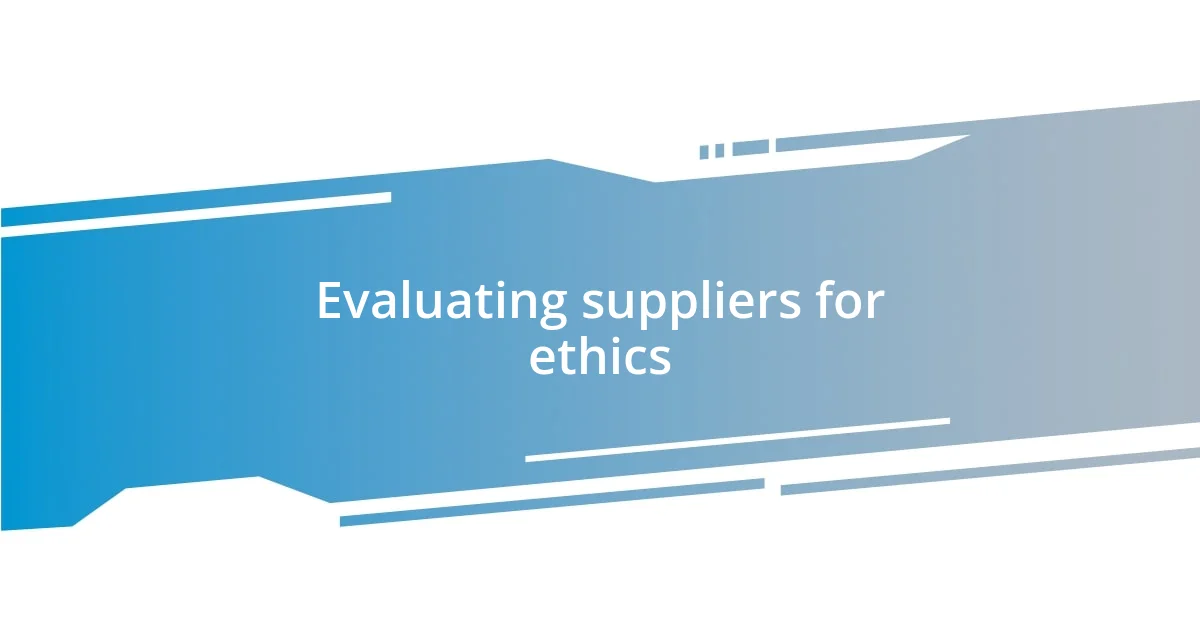
Evaluating suppliers for ethics
When evaluating suppliers for ethical practices, I often find myself diving deep into their labor policies. I recall a time when I approached a supplier known for their craftsmanship, only to discover they didn’t provide basic benefits to workers. That revelation hit hard. It made me question my own buying decisions—how could I support a brand that didn’t support its people? This experience taught me that understanding a supplier’s treatment of its employees is crucial, as it reflects their overall ethical standards.
Another aspect I focus on is a supplier’s environmental commitment. During a factory visit, I was surprised to see how wasteful their processes were, despite their attractive packaging claiming sustainability. It struck me that surface-level claims could hide a lack of genuine effort. If a supplier is not transparent about their environmental practices, how can we trust their commitment to ethical sourcing? That question lingered in my mind, reminding me that transparency is a key metric when assessing a potential partner.
Moreover, I believe it’s essential to look at the supplier’s community engagement. I once partnered with a small brand that actively supported local initiatives, and it made me feel like I was part of something bigger than just a product transaction. Their connection with the community resonated with me, reinforcing my decision to choose them over larger corporations. This personal connection reminds me that ethical sourcing is about building relationships, not just a supply chain. So, when evaluating suppliers, how could we overlook the impact they have on their communities? It’s all about finding that balance between quality, ethics, and connection.
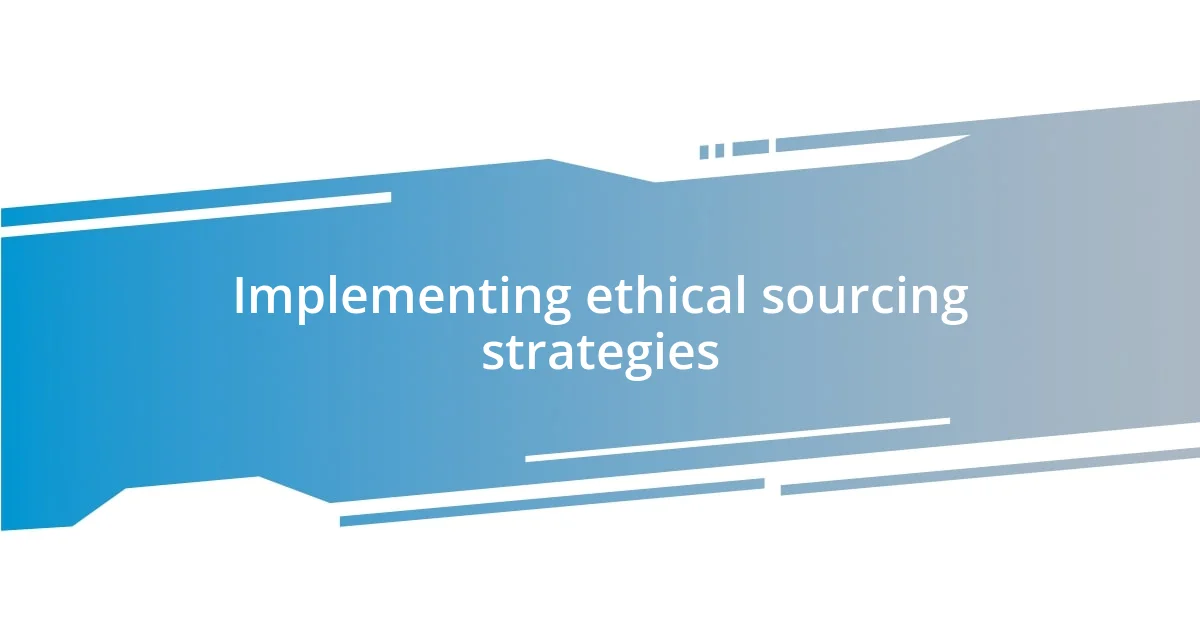
Implementing ethical sourcing strategies
Implementing ethical sourcing strategies requires a holistic approach that engages everyone in the supply chain. I often think about a collaboration I had with a brand that was genuinely invested in ethical sourcing. They went the extra mile, not just checking boxes, but genuinely partnering with suppliers for worker education and environmental initiatives. What struck me during this partnership was the transformation that occurred. Educating suppliers led to a more conscientious production process, benefiting everyone involved. Isn’t it inspiring to see how a collective effort can lead to positive change?
Another critical element is ongoing monitoring and evaluation. I once worked with a company that implemented surprise audits to ensure compliance with ethical practices. I’ll never forget the conversations I had with employees during those visits. Their openness about working conditions showed me the importance of creating a culture of accountability. This proactive stance not only improved working conditions but also fostered trust and loyalty. Could regular check-ins be the key to maintaining ethical standards in a world that often prioritizes profits over people?
Finally, engaging customers in the conversation about ethical sourcing can be hugely beneficial. I vividly remember the excitement in a community forum where consumers were discussing the impacts of their purchasing decisions. It felt empowering to share knowledge and experiences, illuminating the path for more responsible choices. This kind of dialogue creates a sense of ownership and motivation among consumers, urging brands to be more transparent. How impactful would it be if every consumer took an active role in demanding ethical practices? By empowering consumers and promoting awareness, we can create a marketplace that values ethics as much as it values profit.
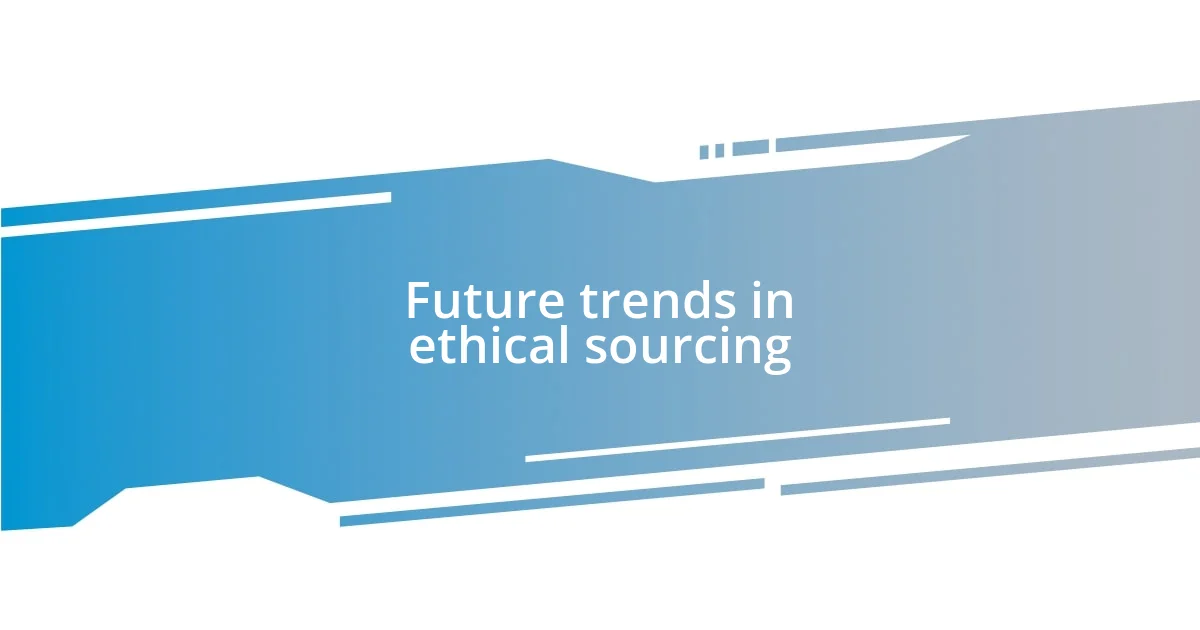
Future trends in ethical sourcing
As I look toward the future of ethical sourcing, I can’t help but feel a growing commitment to technology’s role in the process. I’ve seen firsthand how blockchain can enhance transparency in supply chains. I remember attending a seminar where a brand demonstrated how they tracked materials from origin to end customer. It was fascinating to realize that consumers could verify ethical claims at the click of a button. Can you imagine a world where every purchase comes with the kind of reassurance that only real-time data can provide?
Sustainability is surely at the forefront of trends in ethical sourcing. From my experience, consumers are increasingly looking for brands that prioritize eco-friendly practices. I recently switched my coffee brand after learning they implemented a zero-waste policy in their production. It was more than just a beverage choice; it felt like a step toward supporting something larger. What if more companies could embrace sustainability as a core value, rather than a mere marketing tactic?
Diversity and inclusivity in the supply chain are becoming non-negotiable. I remember a discussion with a supplier who shared their journey toward hiring based on equity and opportunity. It was enlightening to witness how this shift positively affected their workplace culture and productivity. Isn’t it remarkable how inclusivity fosters innovation? As businesses evolve, I firmly believe that those who champion diverse suppliers will ride the wave of change, setting the standard for ethical sourcing in years to come.






